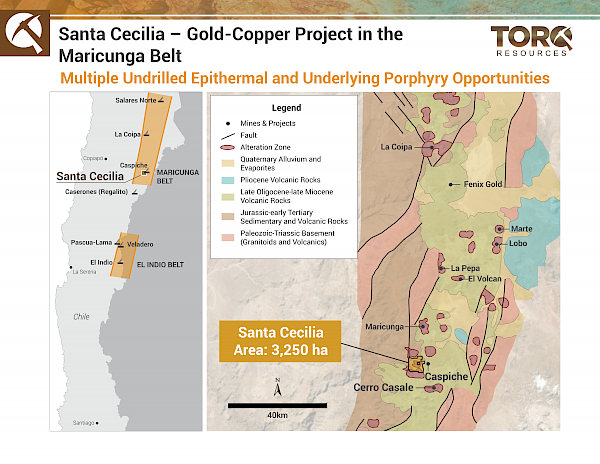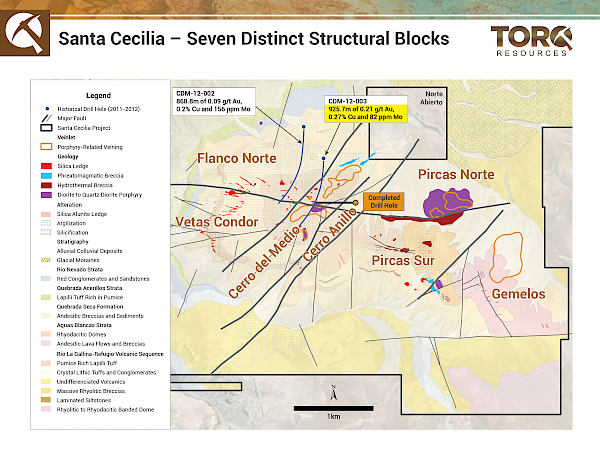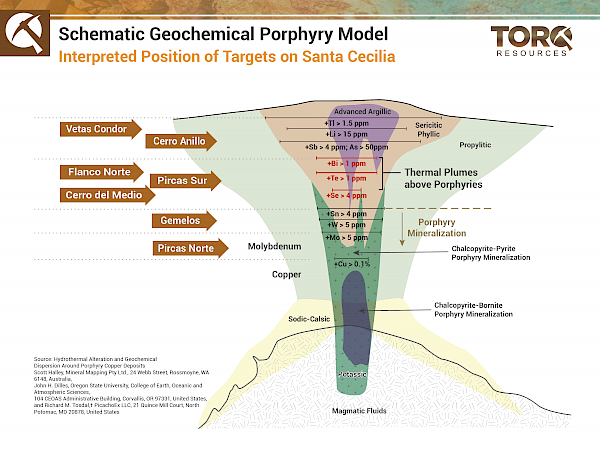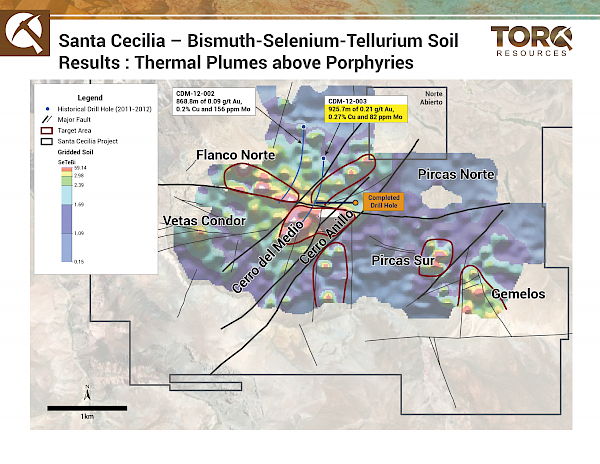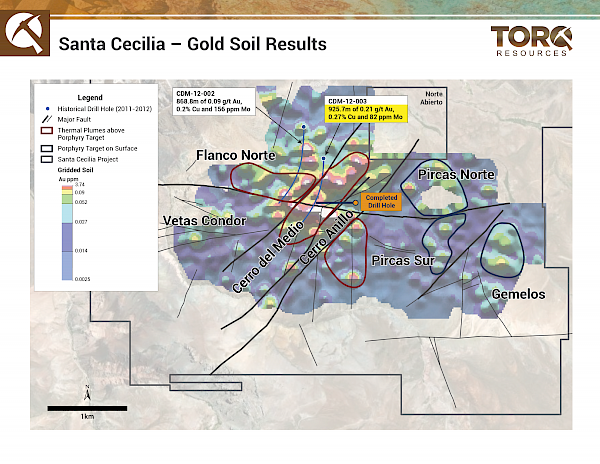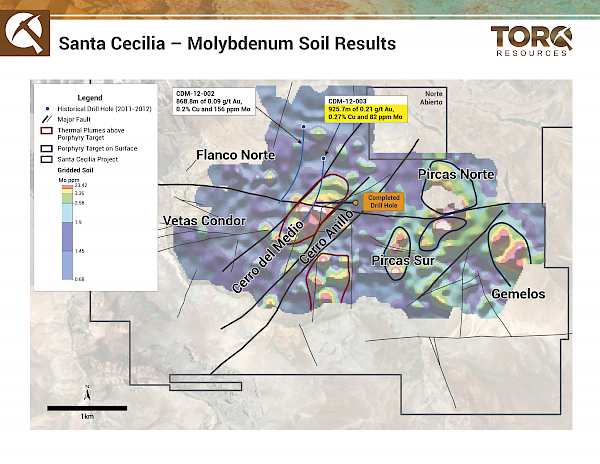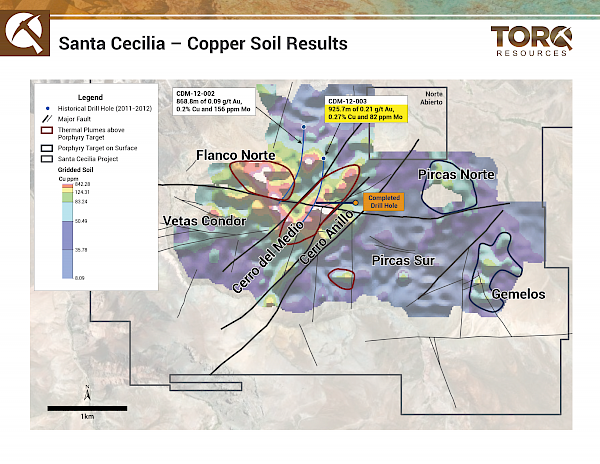Vancouver, Canada – May 3, 2023 – Torq Resources Inc. (TSX-V: TORQ, OTCQX: TRBMF) (“Torq” or the “Company”) is pleased to announce the results of its 85% completed soil survey from the Santa Cecilia gold – copper project located in the world-class Maricunga belt in northern Chile, approximately 100 kilometres (km) east of the city of Copiapo. The project is located immediately adjacent to the Norte Abierto project held by Newmont and Barrick, which is comprised of the Caspiche and Cerro Casale gold – copper porphyry deposits (Figure 1).
The results of the soil survey are based on a total of 1,503 of 1,735 soil samples that have been collected on a 70 metre (m) by 70 m grid across the Santa Cecilia hydrothermal system. The results indicate a total of seven porphyry targets, one of which is being drilled in the current program. The soil geochemistry results, in conjunction with structural mapping, have divided the property into seven distinct structural blocks that are interpreted to represent different levels of an idealized porphyry system (Figures 2 - 3). Each of the blocks acts independently from the other with different levels of porphyry emplacement observed and with the block bounding structures representing prospective structural corridors for the emplacement of high-grade causative intrusions. The Company’s technical team believes each target area has the potential for a major porphyry discovery.
A Message from Michael Henrichsen, Chief Geological Officer:
“The seven porphyry targets we have identified demonstrate the potential for multiple major porphyry discoveries at Santa Cecilia. We believe the adjacent Norte Abierto project owned by Newmont and Barrick is part of a cluster of porphyries that exist within the more than 10 square kilometre hydrothermal system that defines the Santa Cecilia project. The soil geochemistry has provided the Company with a clear data layer that can be used to target the mineral endowment. The positive correlation between mapped structures and geochemistry demonstrates that we are in a mineral system with high potential, predictive porphyries. We are currently completing our second drill hole on the project before pausing the program for the Chilean winter season. We look forward to refining our drill plan for the newly identified porphyry targets over the coming weeks, creating a pipeline of targets for the continuation of our first phase of drilling at the project, which is expected to commence in October.”
Target Areas:
The target areas are primarily defined by the presence of gold and molybdenum, both immobile elements that are directly associated with observed porphyry mineralization in historical drilling and mineralized surface exposures. In addition, the presence of bismuth-selenium-tellurium (Bi-Se-Te) anomalies have been used to identify thermal plumes, which are associated with underlying porphyry systems. The presence of copper was also used to define target areas but is considered less reliable as it is highly mobile during the weathering and overprinting that takes place during hydrothermal events, which are associated with both the porphyry and epithermal style mineralization that has been observed across the property.
Gemelos:
The undrilled Gemelos target is located 1.5 km southwest of the Caspiche deposit and is characterized by a 600 m by 400 m area with strong gold and molybdenum soil anomalies (Figures 5 - 6). Within this anomalous gold and molybdenum area, banded quartz-magnetite veinlets are observed in both dacitic porphyries and overlying volcanics on surface, which indicates that the porphyry target is at shallow depths. In addition, a Bi-Se-Te anomaly is observed offset to the southwest of the gold and molybdenum anomaly that could be associated with the observed porphyries to the northeast, as it may represent a thermal plume associated with a different porphyry body at depth (Figure 4).
Pircas Norte:
The undrilled Pircas Norte target is characterized by a 1 km by 600 m gold – molybdenum - copper anomaly where dioritic to quartz dioritic porphyry bodies are poorly exposed on surface (Figures 5 - 6). Three historical rock samples taken from these porphyry bodies reported a best result of 1.4g/t gold and 0.5% copper associated with the sheeted quartz-pyrite-chalcopyrite and banded quartz-magnetite veinlets within the porphyry bodies that exhibit chlorite alteration after secondary biotite. The majority of the Pircas Norte block is under colluvium cover and therefore the soil anomalies have been critical in defining the scale of the target. Due to mineralized porphyry being present on surface no higher level Bi-Se-Te anomalies are observed in the Pircas Norte block.
Pircas Sur:
The Pircas Sur target area has five shallow (less than 150 m) historical drill holes, drilled by a major mining company between 1988-1990, testing for shallow oxide gold epithermal mineralization. These drill holes did not test the underlying porphyry targets that the Company has identified. Targets within the Pircas Sur block represent a higher level of the porphyry system, with two Bi-Se-Te anomalies overlapping with gold and/or molybdenum anomalies (Figures 4 – 6). The western and eastern target areas within the Pircas Sur block measure 700 m by 500 m and 500 m by 400 m, respectively. These anomalies are characterized geologically by extensive silicification, vuggy silica, quartz-alunite ledges and phreatic breccias that collectively represent a higher-level epithermal part of the system on the project. Copper is not anomalous in the Pircas Sur block, which is consistent with a higher level epithermal environment.
Cerro Anillo:
The Cerro Anillo block is characterized by a 250 m wide north-east trending structural zone that represents the boundary between the Pircas Norte and Sur blocks and the Cerro del Medio block. Both epithermal and porphyry styles of mineralization have been observed in this structural zone where dioritic porphyries with sheeted quartz-magnetite veinlets and abundant quartz-alunite alteration are present. The overlapping styles of mineralization have demonstrated that this structural block has acted as a focal point for both mineralizing hydrothermal fluids and porphyry bodies and is considered highly prospective for potential high-grade causative intrusions.
Cerro del Medio:
The Cerro del Medio block is characterized by the largest Bi-Se-Te anomaly on the property and is coincident with gold, molybdenum and copper anomalies that are concentrated along a northeast trend over a 1.2 km by 600 m area (Figures 4 – 7). The Cerro del Medio target area is geologically characterized on surface by epithermal style mineralization where vuggy silica, quartz-alunite ledges and pyrite-enargite have been observed. In addition, porphyry mineralization is observed within the target area where dioritic porphyries with sheeted quartz veins are cut by later quartz-limonite veins. The large-scale nature of the thermal plume Bi-Se-Te and molybdenbum anomalies demonstrate a large-scale porphyry system is present at depth, with the underlying 2012 discovery drill hole of 925.7 m of 0.21 g/t gold, 0.27% copper and 82 parts per million molybdenum within wall rock demonstrating the potential for a large-scale discovery associated with a higher-grade causative intrusion within the Cerro del Medio block.
Flanco Norte and Vetas Condor:
The prominent east – west trending structure that has been mapped across the project area exhibits coincident Bi-Se-Te, copper and gold anomalies over an area of approximately 1 km by 500 m (Figures 4, 5, & 7). A drill hole from 2012 tested this area at depth and returned an intercept of 868.8 m of 0.2% copper, 156 ppm molybdenum and 0.09 g/t gold. This intercept is hosted within wall rock and Torq’s technical team believes there is the potential for a high-grade causative intrusion along these east – west trending geochemical anomalies.
At Vetas Condor a 500 m by 500 m gold anomaly is associated with east-trending quartz alunite ledges and associated gold – silver epithermal mineralization (Figure 5). A historical exploration tunnel oriented sub-parallel to the quartz alunite ledges totals approximately 1,100 m and has demonstrated consistent mineralization over several hundred metres. The first 32 m of the tunnel returned 2.38 g/t gold and 101 g/t silver and the next 132 m returned 0.66 g/t gold and 13.5 g/t silver. In addition, approximately 436 m into the tunnel, a high-grade vein sampled 58 g/t gold and 27 g/t silver over 2 m. Three short historical drill holes were drilled near the entrance of the tunnel and intercepted 20 m of 6.82 g/t gold and 16.8 g/t silver, including 2 m of 55 g/t gold and 121 g/t silver. Torq’s technical team believes that the mineralization at Vetas Condor has not been adequately drill tested for the definition of a potentially high-grade epithermal system.
Figure 1: Illustrates the location of the Santa Cecilia project and the surrounding Caspiche and Cerro Casale deposits, held by Newmont and Barrick in the Norte Abierto joint venture, within the Maricunga belt.
Figure 2: Illustrates the presence of seven distinct structural blocks across the Santa Cecilia project. Each structural block has important characteristics which represent different vertical levels within an idealized porphyry. The Company’s technical team believes that the structural corridors that define the individual blocks have the potential to host high-grade causative intrusions.
Figure 3: Illustrates an idealized porphyry section with the targets from each structural block identified. Gemelos and Pircas Norte are believed to be partially exposed porphyry systems and Cerro del Medio, Pircas Sur and Flanco Norte represent porphyry targets at relatively shallow depths. The Vetas Condor and Cerro Anillo blocks show the potential for higher level epithermal targets.
Figure 4: Illustrates bismuth-selenium-tellurium targets that represent thermal plumes above potential porphyry mineralization. Target depths for the porphyries are based on geophysics and are thought to be within several hundred metres from surface.
Figure 5: Illustrates gold anomalies and target areas across the project area. These gold anomalies can be directly associated with gold mineralization associated with outcropping porphyries, as highlighted by the blue target areas at Gemelos, Pircas Norte and Pircas Sur. The other gold anomalies associated with the thermal plumes are interpreted to have gold introduced into the mineralized system by both porphyry and epithermal events overprinting one another.
Figure 6: Illustrates molybdenum anomalies across the project area that are interpreted to be directly associated with either porphyry mineralization on surface or at shallow depths.
Figure 7: Illustrates copper anomalies across the project area. Potential porphyry mineralization is interpreted to occur at surface or at shallow depths where copper, gold and molybdenum anomalies overlap, such as at the Gemelos and Pircas Norte target areas.
Michael Henrichsen, P.Geo. (the Company’s Chief Geological Officer), is the qualified person who assumes responsibility for the technical contents of this press release.
ON BEHALF OF THE BOARD,
Shawn Wallace
CEO & Chair
For further information on Torq Resources, please contact Natasha Frakes, VP, Communications, at (778) 729-0500 or [email protected].
About Torq Resources
Torq is a Vancouver-based copper and gold exploration company with a portfolio of premium holdings in Chile. The Company is establishing itself as a leader of new exploration in prominent mining belts, guided by responsible, respectful and sustainable practices. The Company was built by a management team with prior success in monetizing exploration assets and its specialized technical team is recognized for their extensive experience working with major mining companies, supported by robust safety standards and technical proficiency. The technical team includes Chile-based geologists with invaluable local expertise and a noteworthy track record for major discovery in the country. Torq is committed to operating at the highest standards of applicable environmental, social and governance practices in the pursuit of a landmark discovery. For more information, visit www.torqresources.com.
Soil Sampling
Approximately 1-3 kg of soil material was collected on a 100 m x 100 m grid and sent to ALS Lab in Copiapó, Chile or La Serena, Chile for preparation and then to Santiago, Chile and Lima, Peru for analysis. All samples are assayed using 30 g nominal weight fire assay with AAS finish (Au-AA23) and multi-element super trace four acid digest ICP-AES/ICP-MS method (ME-MS61L). QA/QC programs for 2022-2023 soil samples using internal standard samples and duplicates, lab duplicates, standards and blanks indicate good accuracy and precision in a large majority of standards assayed.
Forward Looking Information
This release includes certain statements that may be deemed “forward-looking statements”. Forward-looking information in this release are statements that relate to plans for future exploration programs. These statements involve known and unknown risks, uncertainties and other factors which may cause actual results, performance or achievements of the Company to be materially different (either positively or negatively) from any future results, performance or achievements expressed or implied by some of the principal forward-looking statements. See Torq’s Annual Information Form filed March 27, 2023 at www.sedar.com for disclosure of the risks and uncertainties faced in this business.
Neither the TSX Venture Exchange nor its Regulation Services Provider (as that term is defined in the policies of the TSX Venture Exchange) accepts responsibility for the adequacy or accuracy of this release.

